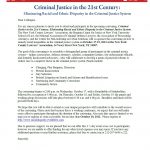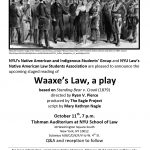Making Constitutional Change: The Past, Present and Future Role of Perry v. Brown

The N.Y.U. Review of Law & Social Change and NYU OUTLaw invite you to attend our upcoming symposium, Making Constitutional Change: the Past, Present, and Future Role of Perry v. Brown. The symposium will focus closely on this landmark Ninth Circuit case– holding California’s Proposition 8 in violation of the U.S. Constitution– and gathers many of its key players, including the lead Perry litigators themselves.
On Friday, October 5, at 9:00 a.m., MSNBC host Rachel Maddow will interview Perry litigators David Boies (LL.M. ‘67) and Theodore B. Olson. After, from 11:00 a.m. to 5:30 p.m., three panels will address Perry’s effect on the larger LGBTQ-rights movement, its effect on other marriage-equality litigation strategies, and how, in an ideal world, Perry should be decided if it goes to the Supreme Court. Panelists include Matt Coles, Erwin Chemerinsky, David Cruz ’94, Jon W. Davidson, William Eskridge, Jr., Roberta A. Kaplan, Melissa Murray, Jennifer C. Pizer ’88, Reva Siegel, Paul M. Smith, Therese Stewart, Andrea J. Ritchie, Adam Umhoefer, Evan Wolfson, and Kenji Yoshino, Chief Justice Earl Warren Professor of Constitutional Law at NYU School of Law.
Five and a half CLE credits are available for those attending all of the events on Friday, October 5.
We will also be hosting a staged reading of the American Foundation for Equal Rights and Broadway Impact’s 8, a play by Oscar-winning screenwriter Dustin Lance Black the night before, on Thursday, October 4 at 7:00 p.m. The play draws verbatim on Perry’s trial transcript and supplemental interviews. Will Pomerantz, of Epic Theater Ensemble, is directing and producing our show. The 90-minute reading will be followed by a discussion with Perry lay witness Ryan Kendall, Executive Director of the American Foundation for Equal Rights Adam Umhoefer, Executive Director of Epic Theater Ensemble Ron Russell, and the performers. Vice Dean Randy A. Hertz will moderate a conversation about how stories change minds. The panelists will also take questions from the audience.
All events are free and open to the public and will be held at NYU School of Law in Vanderbilt Hall, located at 40 Washington Square South, New York, New York.
If you have not yet registered and would like to attend any of these events, please register at http://nyulaw.imodules.com/makingconstitutionalchange.
Click here to visit the N.Y.U. Review of Law & Social Change’s website for more information, including CLE materials and a full schedule, or copy and paste the link below.
http://www.socialchangenyu.com/symposium
Cordially,
Mateya Kelley
Symposium Editor
N.Y.U. Review of Law & Social Change
Geoffrey Wertime
Co-Chair
NYU OUTLaw
NYAWC 30th Anniversary Gala
Please join NYAWC as we celebrate 30 years of empowering women and children to live free from violence.
Silent Auction, Cocktails, Dinner
Venue: Edison Ballroom: 240 West 47th Street, New York, NY 10036
Tickets: $250. To purchase tickets, please visit our gala page.
To pay by check or invoice, download the invitation, complete the form and mail:
30th Anniversary Benefit & Phoenix Awards
32 Broadway, 10th Floor
New York, NY 10004
See a list of our generous sponsors.
For more information, please contact Vicki Shu at vicki@vsplanningllc.com or (646) 502-5337.
The Litigation Committee met on September 28, 2012 and was privileged to have the Honorable George A. Yanthis speak at the meeting. Anna Mercado and the staff of Phillips Lytle LLP did a wonderful job hosting.
The meeting was well attended thanks to Judge Yanthis, who discussed preferred practices, notable cases and his path to the Judiciary. Judge Yanthis also shared the importance of diversity and public advocacy, as exemplified by his own experience. Attendees had the opportunity to ask practical questions on how to better advocate for their clients. Afterwards, attendees remained to continue networking with each other.
Thanks to Francis Chin for the photos.
NYIC Town Hall Meeting on DACA

Town Hall Meeting on
Deferred Action for Childhood Arrivals
Learn more about Deferred Action and where to get help with your application
11:00 – 12:30, Sunday, October 7, 2012
LaGuardia Community College
31-10 Thomson Avenue
(Enter Community Entrance on Van Dam Street & 47th Avenue)
Long Island City, New York
Please Join Host
Congresswoman Carolyn B. Maloney
and her special guest:
Congressman Luis V. Gutierrez
Along with Representatives of
American Immigration Lawyers Association
CUNY Citizenship Now
New York Immigration Coalition
& United States Citizen and Immigration Service
To view the flyer please click here.







